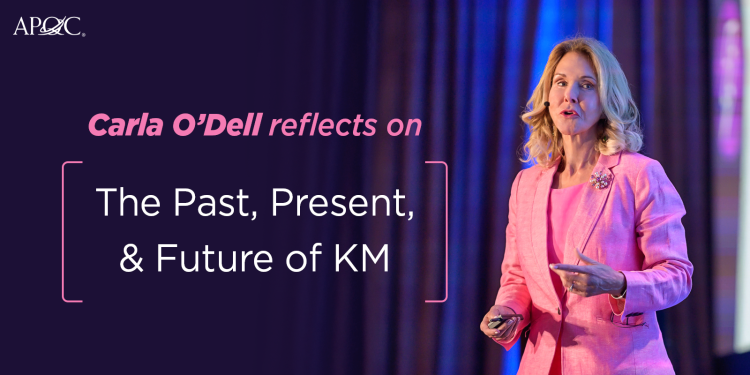
Last year, I introduced the idea of knowledge management (KM) Bridge Builders in my April 25 Blog. These are the passionate individuals who have dedicated years to laying the groundwork for future generations of knowledge workers. Their selfless efforts focus on cultivating a change-resilient culture, nurturing a knowledge-sharing mindset, and harnessing KM as a competitive advantage for their organizations. Since the introduction of the bridge builder series, I have interviewed some amazing experts. You can read their stories in our KM Bridge Builders collection.
Most recently, I was fortunate enough to sit down with someone I have admired, learned from and worked with for two decades—Carla O’Dell, APQC’s chairman, long-time leader in the world of KM and co-author of “The New Edge in Knowledge”.
Imagine stepping into a world that suddenly goes from black and white to full technicolor. That’s how Carla describes her discovery of KM as a discipline. She takes us on a journey through four decades of experience, sharing insights that are both reflective and forward-looking. Her journey—from early benchmarking in Japan to navigating today’s AI landscape—offers lessons for anyone curious about why KM still matters.
Carla’s KM story started in the late 1970s, when she joined APQC, a small nonprofit company helping organizations improve productivity and quality. Early on, she noticed something: organizations often had best practices within their own walls—but they weren’t being shared. That simple insight sparked one of KM’s most fundamental questions: Why doesn’t knowledge transfer naturally?
The answer, as research soon showed, had less to do with systems and more to do with people—relationships, time, distance, and lack of structured ways to share knowledge. When Carla helped organize APQC’s first KM conference and 500 people showed up, she knew they were onto something big.
From there, KM took off. APQC launched its first KM consortium, bringing companies together to study emerging best practices. This work laid the foundation for APQC frameworks and methods that organizations rely on today.
Carla notes that today’s KM landscape is stronger than ever in some areas. There are solid methods, more trained professionals, better tools, and a real understanding of how change management supports KM success. Technology has also evolved—KM isn’t about tech alone, but it certainly can’t scale without it. That said, challenges still remain. Organizations are more cautious about sharing information due to legal concerns, and fewer people attend conferences that once helped KM flourish. Gaining initial funding for KM still takes effort. Her advice? Solve a real business problem and show the value.
One of Carla’s current fascinations is how KM and AI intersect. Right now, AI is helping with very specific tasks, but she believes KM professionals have a critical role in shaping the content AI uses—and in connecting the dots across silos. “AI is only as smart as what you feed it,” she says. Carla also warns against assuming AI can replace human expertise. If anything, it raises the stakes. Experts still need to ask the right questions, interpret data, and mentor others before they retire. She stresses that we’ve overlooked how important it is to locate and nurture expertise within organizations.
As for those starting out in KM? Carla’s advice is simple: Start by solving problems that matter. Build partnerships. Read widely. And know that you are part of a growing, global discipline with real impact. KM may have changed, but its purpose hasn’t: helping knowledge flow where it’s needed most.
Click here to read the full interview.